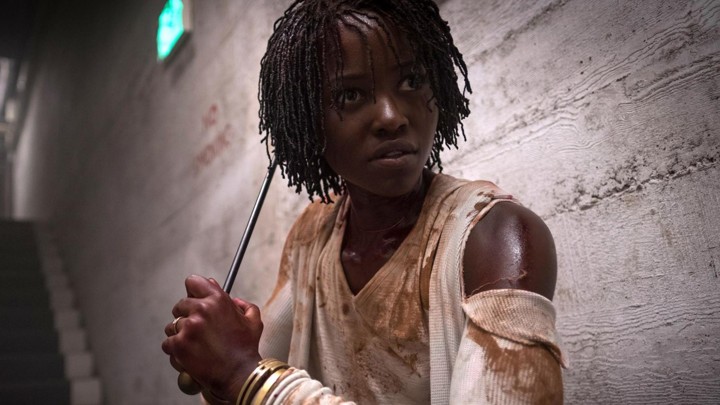Editor-in-Chief Robbie Cairns reviews Us, the second film from Jordan Peele which hit cinemas yesterday.
After the commercial and critical success of his directorial debut, Get Out (2017), there was always going to be a huge amount of pressure on Jordan Peele to deliver in the second of his ‘social thrillers’, Us. For all its jump scares, horror can be a remarkably stagnant genre, requiring constant innovation to thrill and excite audiences who have seen it all before. But if Get Out was a bad dream, Us is a nightmare of the most disturbing proportions. Discomforting, grotesque and undeniably stylish, Jordan Peele’s latest endeavouris psychological horror at its smartest.
When family of four Adelaide (Lupita Nyong’o), Gabe (Winston Duke), Zora (Shahadi Wright Joseph) and Jason Wilson (Evan Alex) take a well-earned vacation to the beaches of Santa Cruz, it doesn’t take long for things to, in Gabe’s words, “get crazy.” After some teasing flashback scenes, the Wilson’s soon find themselves relentlessly stalked by a family of murderous doppelgängers who are out to complete something called ‘the untethering’ – an evil plan which basically involves slitting the throats of everyone in their path with twelve inch scissors.
With the actors having to play both the Wilsons and their twisted counterparts, versatility is a necessity, and the cast excel at portraying both the fear of a family fighting for their lives and the deranged movements of the pursuing doppelgängers. None more so than Lupita; in an outstanding performance reminiscent of Shelley Duvall’s tortured display in The Shining (1980), her efforts are so emotionally draining that you feel almost physically exhausted just from watching.
As expected, Peele’s use of sound is amazing, both in terms of the diegetic soundtrack and the film’s original compositions (the opening credit song will have you squirming in your seat). Despite the ample numbers of scissors on set, the suspense levels are never severed, meaning that Peele’s trademark comedy really pays off in the few moments of light relief. The gore is precise rather than over indulgent, the use of mirrors is inventive and mesmerising, and the abundance of symbolism will have critics and film lovers around the world pouring over the film again and again until they have squeezed out every bit of hidden meaning.
And perhaps that is where the film’s main strength lies: the fact that, while the scares are borderline terrifying at times, it’s the until-recently dormant political undertones which will haunt you on your way out of the cinema. In a modern world accustomed to its fair share of division and wall building, at its very core, Us questions our innate human ability to differentiate between ‘them’, ‘us’ and ‘we’, suggesting that we’re not so different from, but in fact intrinsically connected to, the ‘others’ we fear before we turn out the light.
However, although the film is obsessed with duality, there are more than two conclusions to draw from this allegorical masterpiece. A hall of mirrors of endless questions and answers, you’ve just got to find the reflection that suits you – and it may look more similar than you first expected.
Robbie Cairns
Image Courtesy of Universal

